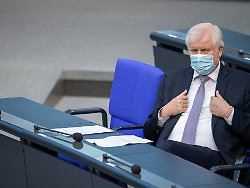Saturday February 13th 2021
"That's enough!"
Seehofer counters EU criticism of border controls
From Sunday, Germany closes its borders for citizens from the Czech Republic, Tyrol and Slovakia. Interior Minister Seehofer harshly rejects EU criticism of the measures. The Commission had made "enough mistakes" in procuring vaccines, the CSU politician wedged in the direction of Brussels.
The critical voices about the German border controls that will apply from Sunday are getting louder – and the answer is also getting sharper. Federal Minister of the Interior Horst Seehofer once again sharply rejected the criticism from Brussels of the border controls along the Czech and Austrian borders.
"That's enough! The EU Commission has made enough mistakes in procuring vaccines in the last few months," said the CSU politician of the "Bild" newspaper. "The EU Commission should support us and not throw clubs between our legs with cheap advice."
In view of the new entry restrictions from the Czech Republic and Tyrol, the EU Commission had previously asked Germany to grant exemptions for commuters, for example. A spokesman for the authority recalled that the EU states had only recently agreed on joint recommendations for traveling in Corona times. Expect all countries to act accordingly. However, the new restrictions and border controls that will apply from Sunday do not provide for such exceptions.
Entry only in exceptional cases
This also outraged the Tyrolean governor Günther Platter and his deputy Ingrid Felipe. This would make work impossible for thousands of Tyroleans who commuted to work in Bavaria, said Plattner. According to the current Bavarian rules, people who lived in Germany but worked in Tyrol would also have to go into quarantine on their return journey. "This would mean that cross-border joint work and economic activity in the border regions would almost come to a standstill, which also cannot be in Germany's interest," they criticized.
According to the federal government, from Sunday only Germans, foreigners with a residence and residence permit in Germany, seasonal agricultural workers and health workers will be allowed to enter Austria from the Czech Republic and large parts of Tyrol. In order to enforce the ban, the federal police are preparing for stationary border controls.
As the Federal Ministry of the Interior further explained, spouses, registered partners, minor children and parents of minor children are also allowed to come, but only if they cross the border together with the German relative. Truck drivers and other transport personnel in freight transport are also exempt from the ban. In addition, entry for urgent humanitarian reasons – for example in the event of a death – should be allowed. Test and quarantine regulations also apply in exceptional cases.
There should be no restriction of entry to certain border crossings. The regulations apply to travelers from the Czech Republic and Tyrol with the exception of the Lienz district, the Jungholz community and the Riss valley in the Vomp and Eben am Achensee area.
Police union complains about equipment
Meanwhile, the police union (GdP) criticized the equipment of the federal police. "The technical equipment of the federal police leaves a lot to be desired. There is a lack of container offices, toilet vehicles and large tents to carry out the controls," said the chairman of the GdP district of the federal police, Andreas Roßkopf, of the "Rheinische Post".
The federal police are not well enough staffed for border controls either. There is a risk that those familiar with the area will bypass the controls on field and forest paths. In order to prevent this, more emergency services are needed: "I expect an additional effort of several hundred from the riot police who will be permanently on duty," said Roßkopf.
The federal government also classified the EU country Slovakia on Friday as an area with particularly dangerous virus mutations, as the Robert Koch Institute announced on its website. This means that airlines as well as bus and train companies are no longer allowed to transport passengers from Slovakia to Germany. Exceptions are German citizens and foreigners living in Germany.
. (tagsToTranslate) Politics (t) Coronavirus Mutation (t) Corona Measures (t) Horst Seehofer (t) Border Controls (t) Czech Republic (t) Austria
